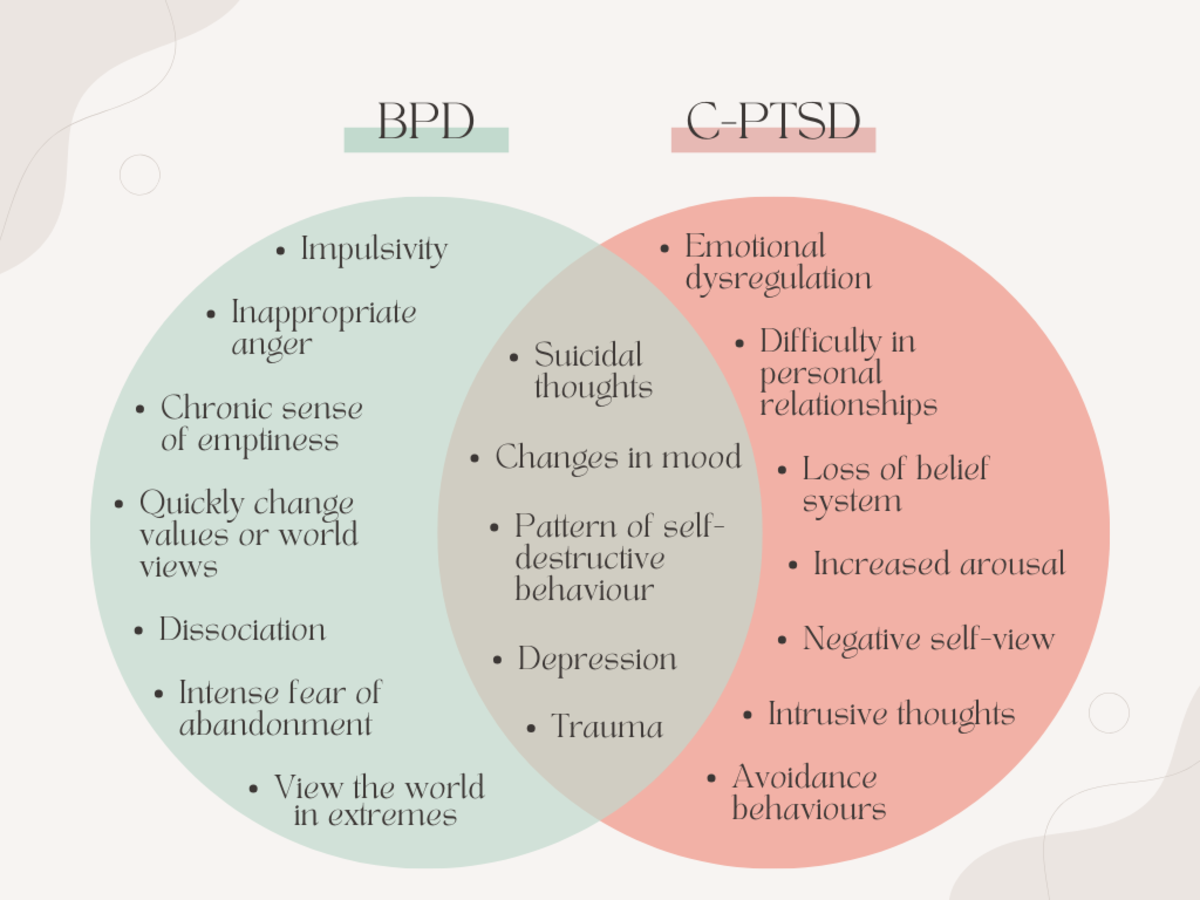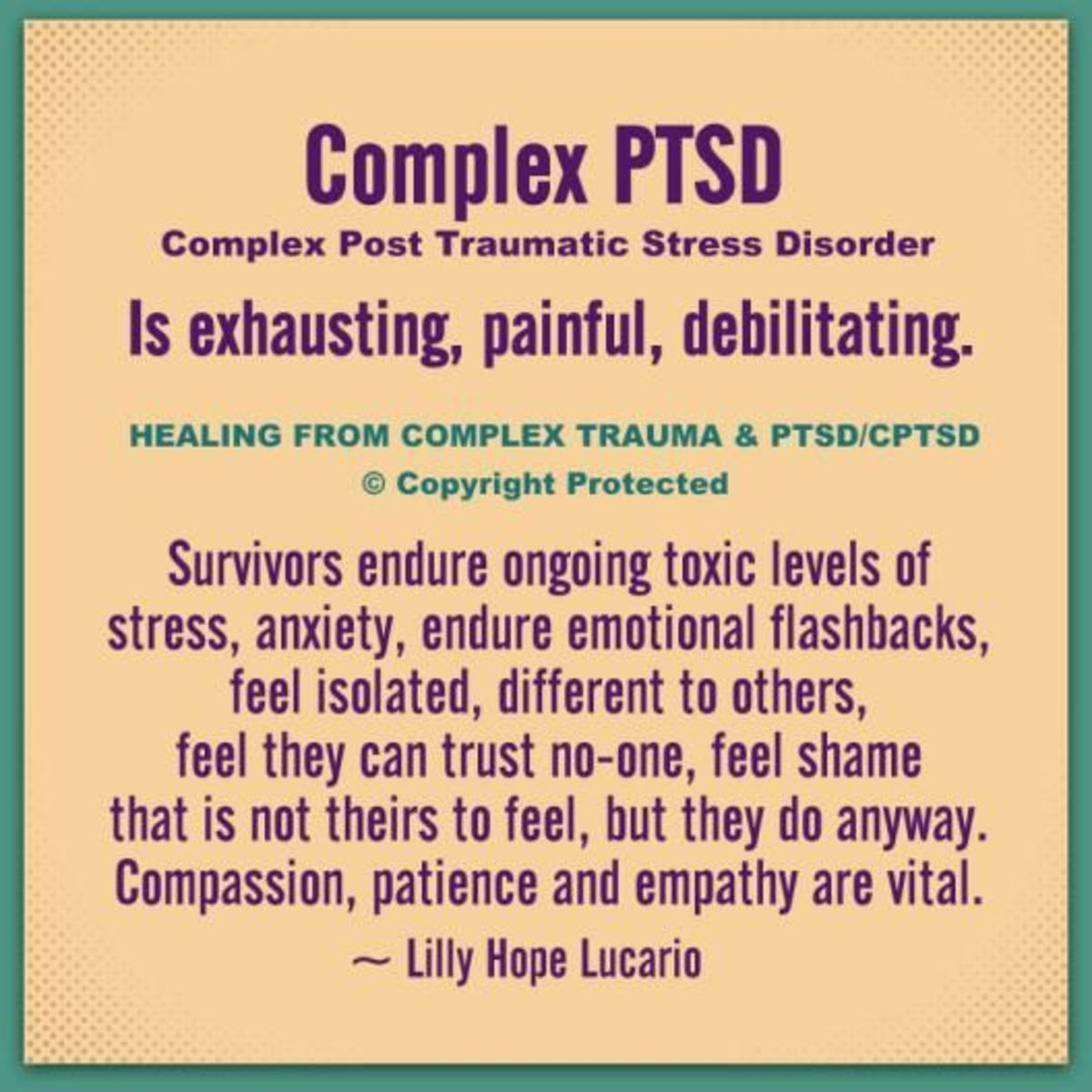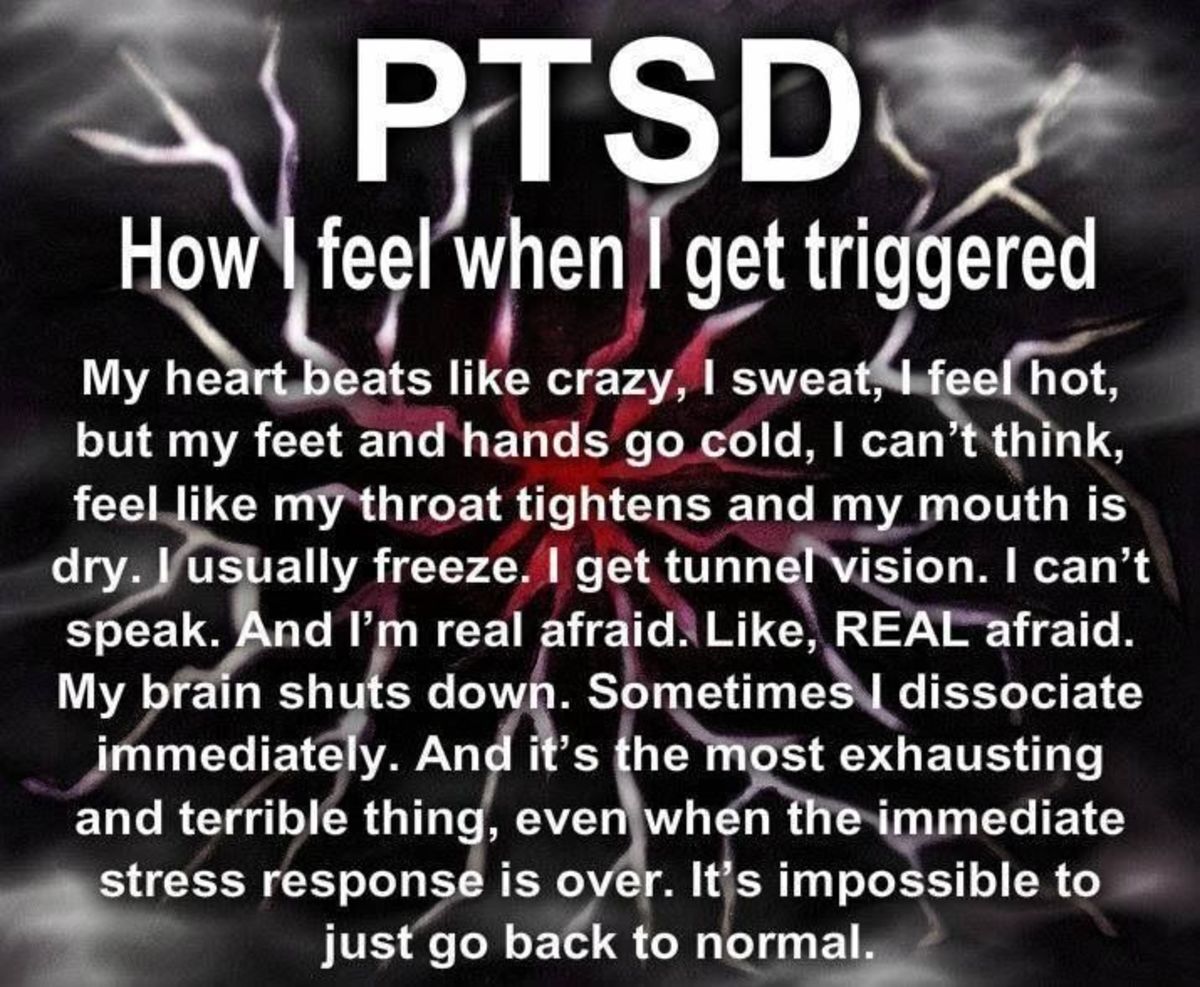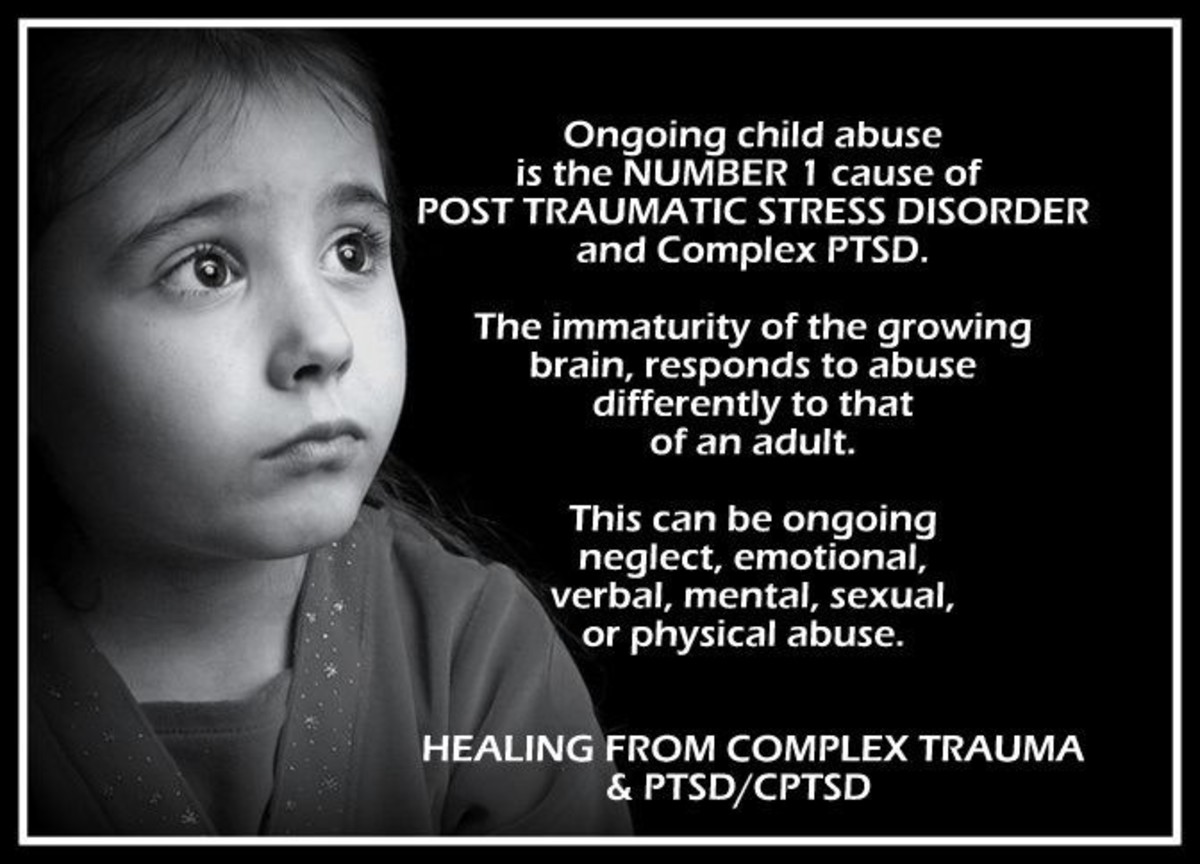- HubPages»
- Health»
- Mental Health»
- Emotions
Effects of Emotional Trauma
Trauma

Experiencing Trauma
Many, many of us have had to deal with some sort of trauma that we experienced.
It can be very difficult to deal with and get beyond painful incidents and events that have caused us great distress. Trauma can cause us so much discomfort that we choose to not think about it at all in order to avoid the emotional pain it causes us.
When we do this, we close ourselves off and shut our feelings down about what happened, in order to protect ourselves from these painful feelings.
People sometimes can unconsciously forget that an event happened. They may intentionally or unintentionally alter their memory in order to reduce their pain. Some people may even lie so that the situation suits them better. In all of these incidences, the brain suffers by not working at full capacity. This occurs because when we shut off part of our brain in order to help us function, we also lose access to that part of the brain.
Dealing with trauma ineffectively affects our mental and physical health. Traumas can affect us emotionally to the point that our thinking, feeling, memory, perception, and overall functioning may be compromised. Physically, we may lose our sense of self, lower our immune system, affect our digestive system, and cardiovascular system in addition to concerns.
Trauma is a Subjective Reaction
Dealing with Trauma
We try to block out painful events. The problem is that the incident really did happen to us, and a part of us can never erase it from our memory. We may be having internal conflicts and not even be aware of this, which will inevitably lead to other physical and mental dysfunctions. Our energy, mood level, self esteem, and personality may be negatively impacted.
Very often, trauma that is not dealt with can cause a person to feel more neurotic, and have more fears and anxiety. This can result in compulsions, odd behavior, phobias, or even psychotic episodes, and other deeper psychological issues. Some people may gain too much weight, or lose too much weight. Some people may develop physical ailments, disorders, and diseases. Some of this may lead to bad habits, feelings of panic, extreme nervousness, anxiety, and a diminished mental sharpness. Some people may develop addictive habits from cigarette smoking to substance abuse, nail biting, stuttering, eating disorders, cutting, and other activities involving self harm.
Sometimes people will visit a medical doctor with vague complaints, and the doctor may never even ask if the patient has had any traumatic experience. Yet trauma is often a contributing factor as the cause of ailments in the majority of situations, leading to physical pain, nutritional deficiencies, and mental unbalance. From headaches and nausea to strained relationships, the experience of trauma can have short and long term detrimental results.
Dealing with Trauma

Emotional Responses to Traumatic Events
Being part of a traumatic incident can cause a person to intensely feel helpless, and can cause a person to become detached from what happened. This can cause some to lose the ability to concentrate and become irritable, overly aggressive, extremely vigilant, and have flashbacks. These are all ways for the mind to respond to trauma.
The immediate emotional response to trauma is often shock and denial. Afterwards and in the long term there are many unpredictable feelings that may occur. Some people have a difficult time moving forward.
Talk therapy is often very helpful for people who are trying to get over trauma.
Vigilance is a way for a person to be self protective and watchful in an attempt to avoid other distressing events. Flashbacks are recurring memories that cause the traumatized person to reexperience the incident.
There are generally two kinds of trauma. One is physical and the other is mental. Physical trauma occurs when the body endures physical injury. Mental trauma can happen from experiencing or witnessing a painful incident, even if there are no physical injuries. Trauma can cause great emotional harm. Secondhand exposure can also cause trauma. Emotionally, people who help trauma victims, and even people who hear stories, or watch mass violence on television, may be affected by trauma too.
People can suffer emotional traumas from being harassed, embarrassed, humiliated, insulted, or deprived. Children are especially prone to this. Parents who are ultra critical of their children, yelling, or harsh punishments can cause a child to be traumatized. This can also come from teachers and people in authority positions who pick on a child. Peers who bully, haze, ostracize, slander, exclude, and mistreat other kids can also impact a person emotionally and psychologically.
Post Traumatic Stress Disorder - PTSD
Adults can be impacted in similar ways. Even events such as a long and bitter divorce, foreclosure of their home, job loss, extreme lifestyle change, and asssaults on their physical health can cause a person trauma. Negative experiences can cause people to suffer mentally and often silently.
PTSD, or post traumatic stress disorder is a psychiatric condition that occurs from a traumatic experience. Not everyone who experiences trauma will suffer from PTSD. Most people who have been part of a traumatic event will return back to their normal selves.
There are some people who have reactions that don’t go away, and may even get progressively worse in time. PTSD often affects people by causing nightmares. People may suffer from disassociation, become estranged, feel detached, have difficulty sleeping and suffer from extreme anxiety over long periods of times. Their anxiety becomes a pervasive part of their thinking, and affects many aspects of their lives. When their quality of life and daily activities becomes impaired, it is important to consider that PTSD may be a factor.
There are approximately 7.8% of Americans will experience some form of post traumatic stress disorder at some point in their lives. Women are two times as likely as men to develop post traumatic stress disorder. In any given year, approximately 5.2 million people in the U.S., have PTSD. Only a small portion of the population have experienced at least one traumatic event in their lifetime. Soldiers in war often suffer from post traumatic stress disorder.
So what is the difference between people who suffer from trauma and those who end up having post traumatic stress disorder?
It can be difficult to distinguish the two, and in fact, they can co-occur. . The risk factor seems to relate to the neuroticism of the individual. Research has shown that people who worry consistently are more prone to PTSD.
In a study done at Michigan State University, using a ten year study of 1,000 randomly selected participants, the data showed that those who were chronically anxious, depressed and tended to overreact to disappointments and challenges were more at risk of developing PTSD. The study evaluated people for neuroticism before they had any traumatic experience.
There is not much that can be done to prevent traumatic responses or PTSD. When trauma interferes with a person’s ability to cope, it is usually known as PTSD.
The field of psychology does not differentiate clearly between stress, trauma, and adaptability. It is the individual person’s own reaction to the experience that determines if the event is traumatic to themselves or not.
Soldiers and Post Traumatic Distress Order

Trauma Defined
It is a uniquely personal experience. Some people are not able to integrate their emotional experience because they find it overwhelming. Some people feel threatened, by the traumatic experience and their ability to cope is compromised emotionally, physically and cognitively. It may occur because of a one time incident, or it may happen from chronic and repetitive events. These circumstances often involve a feeling of feeling helpless, pain, being confused, loss, being subjected to abuse of power, or betrayed by someone else’s trust, feeling trapped, or being persecuted.
Trauma is defined broadly and encompasses responses such as being abused or being a witness to a violent event. Trauma will never be defined by a particular event, as the response and reaction to the event is extremely subjective.
The more severe the trauma, the more psychological damage it may cause. The greater the stressor, the more likely post traumatic stress is likely to develop.The more someone believes they have been endangered, the more traumatized they are, they more helpless they feel. The psychological effects can have long term impacts on a person.
Two people may experience the same event, but one will be traumatized, and the other will not. That is why no one can say what is traumatic for someone. It is not the meaning of the event, it is how distressed the person becomes from the event.
Natural disasters, acts of terrorism, crimes, and accidents are examples of one time events that can cause traumatic reactions.
Repeated and prolonged events, such as abuse can cause serious mental health issues. Abuse purposely inflicted on someone else is hard to bear. War, also is hard for someone to get over.
Trauma can affect so many aspects of the personality of an individual, including their beliefs and perceptions. People may use avoidant tactics in order to protect themselves from re-experiencing the event.
The feelings of trauma stay with the person long after the event has happened. The person may continually react to the memories of the event(s), or fear a recurrence of the experience.
It is natural to use the same protective mechanisms they have continued to use to cope, so that they feel they will not be harmed any longer. It becomes a way to adapt. Problems arise when the person is not able to function in the way they want to.
People who have suffered from traumatic experiences can benefit greatly from professional counseling. As they learn to understand that their adaptive behavior served a purpose in the past, but does not work any longer in the current situation, they can learn to substitute their coping mechanisms with more effective thoughts and behaviors.









